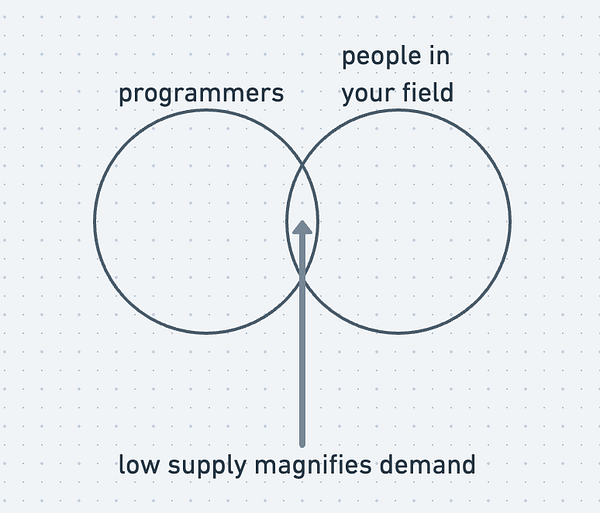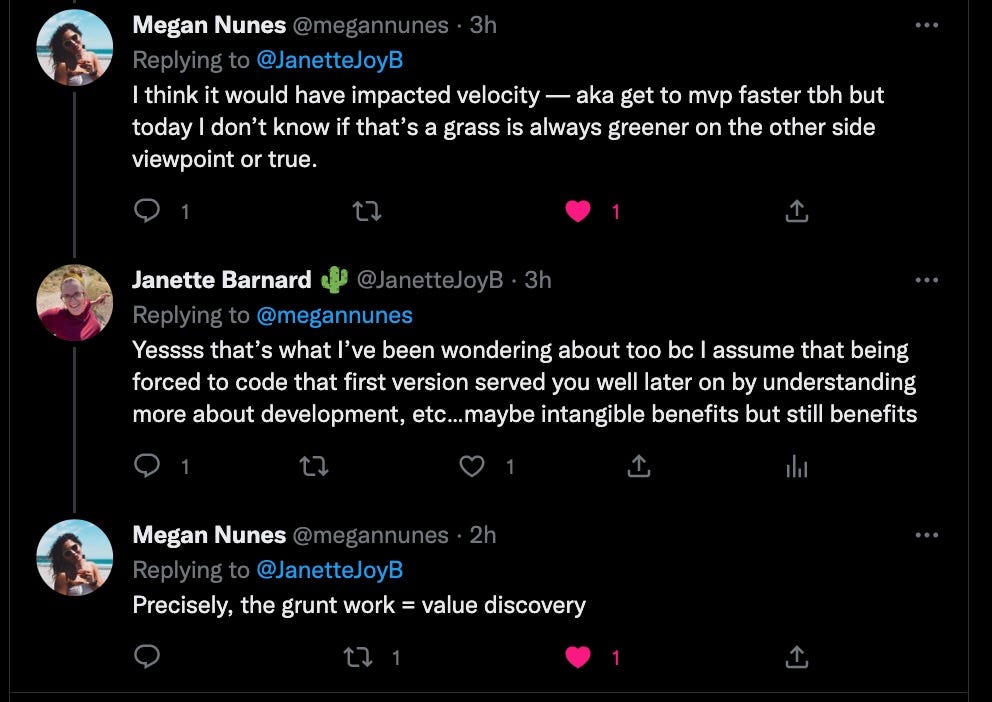baling wire fix or a hack for muggles?
Prime Future 123: the newsletter for innovators in livestock, meat, and dairy
Did y’all know that all incoming freshmen at Purdue University used to be required to take two semesters of computer programming, regardless of their major?
In the 1980's 🤯
I’m a millennial, the first generation that started learning to type in kindergarten. I’ve lived my entire life on the assumption that as a whole my generation was the most tech-savvy, compared with generations prior. And now I learn that before I was even born there were universities requiring students to take computer science classes, the topic I most regret not studying as an undergrad student?!
Why on earth isn’t there a computer science requirement for all majors at all universities today?


I love this point of having a skill set PLUS the ability to code. It’s like being someone with domain knowledge, who can also communicate, e.g. an engineer/vet/nutritionist who can speak well. It’s the combo that is their superpower.
But I was an idiot when I was 19 years old and never considered taking computer science, either not realizing the massive impact tech would make on the ag industry during my lifetime or not realizing someone like me could be part of it. Maybe both.
There's a bit of a juxtaposition here in that while coding skills are more valuable than ever, especially as a secondary skill set, there are more alternatives for those of us muggles who couldn't write a line of code if our lives depended on it: no-code software tools.
Today we’re looking at how no-code software tools could impact the ag industry, specifically how they could be helpful for innovators - either in startups or established companies.
The good news is that this category seems to have moved past its peak in the hype cycle and is now settling in to find its place in the world. Adoption is still early though, with a sense of "the future is here it’s just not evenly distributed”.
Gartner says that by 2024 that 65% of app development be low code or no code. 2024 is umm, right around the corner. (Note: no-code is for us completely non-technical muggles while low-code is for developers.)
Gartner also suggests that by 2030 no-code & low-code will be a $187B market. As a comparison, Gartner projects the global SaaS market will be $381B by 2030. That’s a lot of no-code runway.
So what kind of capabilities can you find in no-code tools? For starters…

I see 2 obvious scenarios where no-code could create high value in ag innovation:
1. Established companies with limited to no development capability internally.
Every big co now has teams of data scientists and programmers on staff, and that's starting to push down market to mid-market companies. No-code tools seem like a way for mid-market companies to dip their toes in the water with early capabilities. A Peco Foods (chicken) or a Creekstone (beef) just aren't going to have the same capacity or capability in this area as a Tyson Foods. But no-code tools could minimize the gap.
Perhaps most interestingly is how these no-code products could either be put to work internally to drive operational efficiency or externally to drive new customer value.
Maybe software products developed using no-code tools will be fully sufficient on their own, or maybe they serve the purpose of running an experiment that proves the larger investment in full infrastructure is worthwhile.
(btw LMK any specific examples in livestock, meat or dairy - I’d love to learn more.)
2. Non-technical founders launching startups.
The entire promise of no-code tools is that non-technical people can build and launch products faster/easer/cheaper.
This means that Non-technical people can build an MVP for a product idea to test the concept in a low-risk way before seeking out a technical co-founder and/or raising capital. Think of the months or even years that this could save, let alone units of sanity.
A friend of mine is a farm kid from the Central Valley of California. A few years ago, with no software development skills to her name, she identifies the challenges for almond growers associated with a limited ability to forecast production each year. She comes up with an idea on how to solve the problem, but in order to even test her concept, she first has to spend a few (really hard) months learning the basics of how to write software. Then do the painstakingly hard work of putting rudimentary skills to work to get to an early version of a product to test with customers, in order to recruit a co-founder and then investors.
I brought up no-code tools on Twitter, and Megan chimed in about how it might have impacted the early start of her company, Bountiful:
There are always tradeoffs though, so would Megan have made progress faster if she’d been able to cobble together no-code tools to come up with an MVP of her yield forecast software that she could take to almond growers and investors? Maybe/probably, but what would she have missed out on compared to the longer/harder road she had to take in learning to code?
Of course, counterfactuals are impossible to know.
No code is definitely something but it is not everything. There are limitations and watch-outs to no-code tools like navigating cybersecurity concerns, limitations to functionality, and knowing when to start building actual software infrastructure to scale a product.
Is no code a hack for us non-technical muggles to get to v 1 of a software product or just the software equivalent of a duct tape and baling wire situation?
Idk but I wanna find out firsthand. Because sometimes duct tape & baling wire fixes are lifesavers.
For non-technical founders whose childhood best friends aren’t wunderkind developers, there are basically 3 options to build & launch a software product:
Take time to learn to code. Ooph.
Find a technical co-founder. But this is like saying “get married by Christmas”…it doesn’t work that way, and most shotgun marriages don’t end well.
Hire a software development shop to build a product. Software shops love non-technical founders because we stink at assessing their pricing, capabilities and timelines. Yes, I did this, and no, I do not recommend. 😑
In general, I think non-technical aspiring founders are going to find some magic in running small experiments on early software product versions created using no-code tools. While it’s not a perfect answer to the non-technical founder’s dilemma above, these tools can at least give you a running start compared with the other options.
I love when technology democratizes stuff.My favorite thing about digital marketplaces is how they democratize individual markets, whether real estate, or farmland, or livestock markets. (ok maybe i just love democracy in general)
And no-code tools have the potential to sort of democratize coding, in the right instances.
As a non-coder who believes tech can unlock mega value, I'm here for it - this is something I’m going to be digging into for myself in the coming months.
But I still wish my university had required this Ag Econ major to take computer science classes. I'm thinking they would have been slightly more relevant to my career than that Italian art history elective I had to take.
Anyway, let's add this discussion to the list of ways in which higher education has lost the plot, and revisit that another day...



